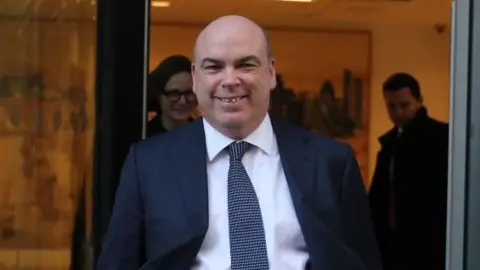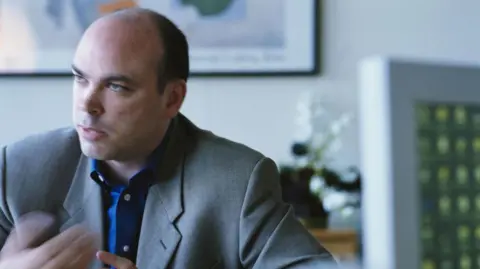British tech tycoon: I only got justice because I'm rich

Mike Lynch leaves High Court in London, 25 March 2019
The British businessman Mike Lynch, who this June was acquitted in the US of a multi-billion pound fraud, has said he believes he was only able to clear his name because of his huge wealth.
Mr Lynch, 59, was facing two decades in jail if had been convicted of the 17 charges he faced, relating to the sale of his tech company, Autonomy, to US firm Hewlett-Packard.
He told the the PM programme, on BBC Radio 4, that though convinced of his innocence throughout, he was only able to prove it in a US court because he was rich enough to pay the enormous legal fees involved.
"You shouldn't need to have funds to protect yourself as a British citizen", he said.
"The reason I'm sitting here, let's be honest, is not only because I was innocent... but because I had enough money not to be swept away by a process that's set up to sweep you away."
He said most people, even they sold all their assets, would run out of funds in a matter of months, a situation that he said "has to change."
HP & Autonomy
Mr Lynch co-founded Autonomy in Cambridge in 1996.
The software company expanded rapidly, becoming one of the UK's leading tech firms. Its success led to Mr Lynch once being dubbed "Britain's Bill Gates."
In 2011, hardware giant Hewlett-Packard bought the firm for $11bn (£8.6bn) - a deal Mr Lynch made £500m from.
The acquisition soon unravelled though as questions were asked about the enormous price tag.
Just a year later, HP wrote down the value of Autonomy - which it said Mr Lynch had exaggerated - by $8.8bn.
Years of legal battles followed then, in 2018, US prosecutors brought charges against Mr Lynch.
They accused him of inflating the value of the firm by using backdated agreements to mislead about the company's sales, said he had concealed the firm's loss-making business reselling hardware, and also accused him of intimidating or paying off people who raised concerns.
They sought to try him in the US - a move Mr Lynch, who lives in Suffolk, resisted.

But in 2022 he was eventually extradited to the US in 2022 to face trial - a process culminated in June this year with Mr Lynch's acquittal.
He testified in court that he was not involved in the transactions being described while his legal team argued HP had failed to properly vet the deal.
Another former finance executive at Autonomy, Stephen Chamberlain, was also found not guilty.
Mr Lynch said the moment he awaited his verdict was "indescribable" and like standing "between two universes".
"Until you hear the words, you can't call it", he explained.
But now that he has been acquitted, he has criticised the government for allowing his extradition in the first place under a treaty which critics - such as Mr Lynch - say makes it far too easy for British people to be tried in the US.
"The British government needs to defend its citizens," he said.
"Is it right to be sending someone to another country, especially one which has the justice system issues of the US?
"A US prosecutor has far more control over you than your local bobby in the British system."
Back to innovating
The charges Mr Lynch was cleared of are not the only legal proceedings arising out of the sale of Autonomy.
In 2019, Autonomy's former chief financial officer Sushovan Hussain was jailed for five years and fined millions of dollars on 16 counts of fraud, securities fraud and other charges.
In 2022, HP won a civil fraud case against Mr Lynch and Hussain heard by London's High Court.
It is now seeking a reported $4bn.
Mr Lynch blamed that on the judge in the case being presented with untested evidence from the US.
He says now though he wants to refocus on his career in tech - saying his recent experiences have given him an interest in how AI can be used in the legal field as well as to help with with hearing loss.
"I want to get back to what I love doing, which is innovating", he said.
Mike Lynch: Priti Patel approves extradition of Autonomy founder
29 January 2022
Home Secretary Priti Patel has approved the extradition of a British tech tycoon to the US to face criminal fraud charges.
The decision comes after Mike Lynch, the founder of Autonomy, lost a multibillion-dollar fraud action in London on Friday.
His firm was sold to US giant Hewlett Packard for $11bn (£8bn) in 2011.
He is accused of manipulating its accounts to inflate the value of the company before its sale.
In 2012, just over a year after the purchase, HP announced an $8.8bn write-down (reduction in estimated value) of the value of Autonomy.
HP sued Autonomy's founder and former chief financial officer, Sushovan Hussain, for about $5bn, claiming they "artificially inflated Autonomy's reported revenues, revenue growth and gross margins".
Mr Justice Hildyard said HP had "substantially won" its case, more than two years after the start of what was believed to be the UK's biggest civil fraud trial - which was heard over nine months in 2019.
But he said the company was likely to receive "substantially less" than the amount claimed in damages.
Mr Lynch always denied the accusations and said on Friday that he would appeal.
His former chief financial officer Mr Hussain was convicted in April 2018 in the US of wire fraud and other crimes related to Autonomy's sale and was jailed for five years.
The decision in court on Friday coincided with a midnight deadline on the same day for the home secretary to decide whether or not Mr Lynch should be extradited to the US to face criminal trial for 14 counts of conspiracy and fraud.
A Home Office spokesperson said: "Under the Extradition Act 2003, the secretary of state must sign an extradition order if there are no grounds to prohibit the order being made. Extradition requests are only sent to the home secretary once a judge decides it can proceed after considering various aspects of the case.
"On 28 January, following consideration by the courts, the extradition of Dr Michael Lynch to the US was ordered."
Kelwin Nicholls, of law firm Clifford Chance, representing Mr Lynch, said in a statement on Friday evening: "Dr Lynch firmly denies the charges brought against him in the US and will continue to fight to establish his innocence.
"He is a British citizen who ran a British company in Britain subject to British laws and rules and that is where the matter should be resolved. This is not the end of the battle - far from it."
The lawyer also confirmed that Mr Lynch would file an appeal to the High Court in London.
What is Autonomy?
The company was founded in 1996 by Mr Lynch out of a specialist software research group called Cambridge Neurodynamics.
Autonomy developed software that could extract useful information from "unstructured" sources such as phone-calls, emails or video.
The software could then do things such as suggest answers to a call-centre operator or monitor TV channels for words or subjects.
It gained a listing on the US Nasdaq exchange in May 2000 at the height of the technology boom and was listed in London six months later.
The company suffered when the technology bubble burst, dropping out of the FTSE 100 and having to issue a profit warning in 2001.
But it grew rapidly and opened joint head offices in Cambridge and San Francisco, with other offices worldwide, to serve 65,000 customer companies.
Autonomy was sold to Hewlett Packard for $11bn (£8bn) in 2011. Mr Lynch left the company in 2012.
Who is Mike Lynch?
Cambridge graduate Mr Lynch, 56, built Autonomy up to be one of the top 100 UK public companies.
In 2006, he was awarded an OBE* for services to enterprise.
A fellow of the Royal Society, Mr Lynch, who lives in Suffolk, previously advised the government and sat on the boards of the British Library and the BBC.
[*OBE ; Order of the British Empire
British order of chivalry
The Most Excellent Order of the British Empire is a British order of chivalry, rewarding contributions to the arts and sciences, work with charitable and welfare organizations, and public service outside the civil service.]
Profile: Autonomy
20 November 2012
Hewlett Packard's allegations that Autonomy inflated its value prior to a takeover has been flatly rejected by the former management of the UK software firm.
But what is Autonomy, and what led HP to pay $12bn (£8bn) for the company last year?
Despite a sponsorship deal with Premier League football club Tottenham Hotspur and once being a constituent of the FTSE 100 index of the largest companies listed in the UK, the firm has rarely hit the headlines.
Autonomy was founded in 1996, when it grew out of the specialist software research group Cambridge Neurodynamics.
It develops software that can extract useful information from "unstructured" sources such as phone-calls, emails or video.
That means its software can do things such as suggesting answers to a call-centre operator or monitoring television channels for words or subjects.
One of the strengths of its business is that in most of the areas in which it operates it has no competitors.
It gained a listing on the US Nasdaq exchange in May 2000 at the height of the technology boom and was listed in London six months later.
The company suffered when the technology bubble burst, dropping out of the FTSE 100 and having to issue a profit warning in 2001.
But, unlike many of the technology companies that had gone to market in the boom, Autonomy was actually profitable.
It grew rapidly, mainly through acquisitions, and opened joint head offices in Cambridge and San Francisco, and other offices worldwide, to serve its 65,000 customer companies.
These include some of the world's leading companies, such as BMW, Lloyds, Nestle, Philips and Shell, as well as US government departments and the UK's Parliament.
'Investor questions'
However, it has at times been unpopular with City analysts.
When it warned in October 2010 that there had been unexpected volatility in its customers' purchasing behaviour and lowered its full year forecasts, analysts piled in to criticise the company, with one of its former managers saying its management setup was more suited to a startup than a major global player.
[Autonomy sponsors Tottenham Hotspur Football Club]
The shares plummeted, despite there already being rumours that a bid could be imminent.
But while some in the City did not like the way it was run, the firm was often cited as a great example of how academic research could be turned into a profitable business.
The company was set up by Mike Lynch, a Cambridge University researcher who had specialised in pattern recognition and had developed a system for reading car number plates for Essex police before he founded Autonomy.
Mr Lynch left the company in May 2012. Reports suggested he was close to Leo Apotheker, the former HP boss who negotiated the Autonomy deal.
After Autonomy missed its targets for the second quarter of the year, Mr Lynch was replaced at the top by Bill Veghte, HP's chief strategy officer.
HP said that it was shortly after this that a senior member of Autonomy's management raised concerns about accounting issues.
Mr Lynch is a non-executive director of the BBC.

No comments:
Post a Comment